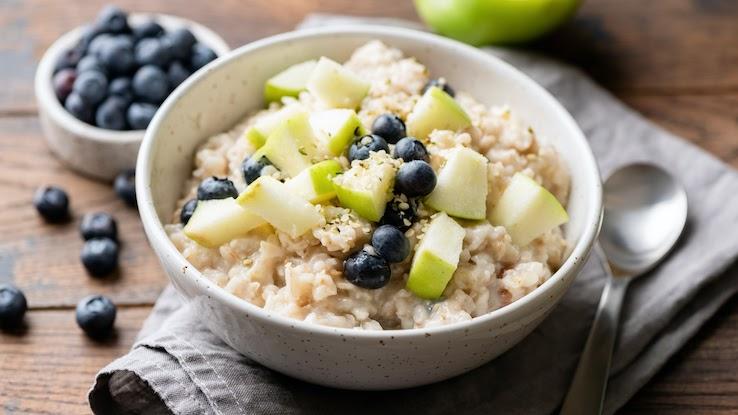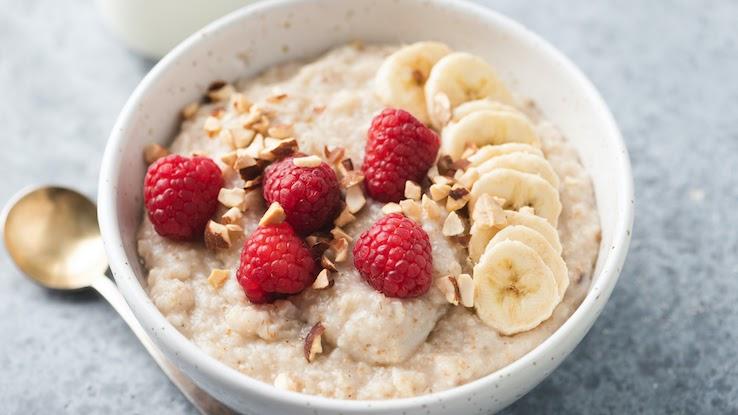
Oatmeal is a popular food choice thanks in large part to its nutrient value and high levels of beneficial bioactive compounds — substances that can have positive health effects. Eating a diet that regularly includes oats or oat products can help you enjoy numerous health benefits, such as weight loss and a decreased risk of developing diseases. By adding oats to your diet, you may see a number of overall benefits to your wellness.
Oats are often found in ready-to-cook forms, such as rolled, quick-cook and steel-cut oatmeals. Instant, or quick-cook, oats take the least time to cook but tend to be more processed. Oats can also be found in cereals, baked goods and granola bars, but eating homemade oatmeal can help you enjoy oats’ health benefits without the extra ingredients processed foods often incorporate.
Ready to see how healthy oatmeal can be? Learn about the following benefits of oatmeal, all of which have been observed and supported by scientific studies.
It Decreases Your Cholesterol
Oatmeal is a rich source of soluble fiber, which is also found in apples, pears, prunes and barley. Soluble fiber inhibits your body’s ability to absorb low-density lipoprotein, or LDL, which is known as the “bad” form of cholesterol. One cup of oatmeal contains about 9 grams of fiber, which, when included as part of a healthy lifestyle, can contribute to a reduction in LDL cholesterol levels over time.

It’s Heart Healthy
Several studies have shown that people who have an increased risk of developing high blood pressure should eat a diet rich in oatmeal. That’s because its bioactive compounds have been shown to have protective effects against cardiovascular (heart) disease. Avenanthramides, which are the primary antioxidant compounds found in oats, increase the production of nitric oxide. This substance helps blood vessels widen and can reduce blood pressure.

Avenanthramides also help to prevent atherosclerosis, which is the hardening of artery walls. They do this by decreasing production of the smooth muscle cells in your veins and by increasing nitric oxide production. In combination, these effects help decrease the overall risk of developing heart disease. Research has shown that postmenopausal people who ate six servings of whole grains like oats per week had a lower risk of developing atherosclerosis and slowed the progression of arterial stenosis (narrowing of the blood vessels).
In addition, avenanthramides have anti-inflammatory and antioxidant properties that work to block free radicals — substances that attack high-density lipoproteins (HDL). HDL is known as the “good” form of cholesterol. Avenanthramides have also demonstrated an ability to decrease musculoskeletal inflammation in postmenopausal people and in other populations.
It Helps Promote a Healthy Weight
Beta-glucan is a soluble fiber with high viscosity that’s found in oats. Fiber-rich foods like oatmeal increase the thickness of the contents in your stomach after you eat, and in turn this slows down the digestion process. This results in a longer period of fullness following a high-fiber meal. Feeling full for longer may help promote a healthy weight by decreasing your desire to snack on unhealthy food items or overeat throughout the day.

It May Decrease Your Risk of Diabetes
Beta-glucan fiber has been shown to reduce blood sugar and help moderate the way people’s bodies respond to insulin after eating a meal. Oatmeal, thanks to its fiber, may be a helpful dietary option if you’re working to lower your blood sugar or if you’re prediabetic. Reduced blood sugar levels paired with other lifestyle adjustments can help prevent the occurrence of Type 2 diabetes.

A diet that’s high in fiber can also help stabilize blood sugar levels and help limit blood sugar spikes and slumps, which often happen after you eat large quantities of processed sugar and carbohydrates. Eating oatmeal for breakfast may help keep your blood glucose levels stable throughout the day.
How Should I Eat My Oats?
Unflavored, uncooked oats are more nutritionally dense than pre-sweetened oatmeal mixes, which typically contain high amounts of sugar and salt. It’s best to eat oatmeal you make at home from scratch so you can have control over what you add to it. You can naturally sweeten your oatmeal using fruit such as apples, strawberries or blueberries or by adding honey or agave syrup. You might also sprinkle on some chopped almonds or walnuts for extra nutrients, but watch your serving size — nuts are healthy in moderation, but they’re higher in calories.

Resource Links:
https://pubmed.ncbi.nlm.nih.gov/25411276/
https://pubmed.ncbi.nlm.nih.gov/11716313/
https://www.ncbi.nlm.nih.gov/pmc/articles/PMC3963458/
https://www.ncbi.nlm.nih.gov/pmc/articles/PMC3999982/
https://www.ncbi.nlm.nih.gov/pmc/articles/PMC6126071/
https://pubmed.ncbi.nlm.nih.gov/18633670/
https://pubmed.ncbi.nlm.nih.gov/16139284/
https://pubmed.ncbi.nlm.nih.gov/16895790/
https://pubmed.ncbi.nlm.nih.gov/16084154/





